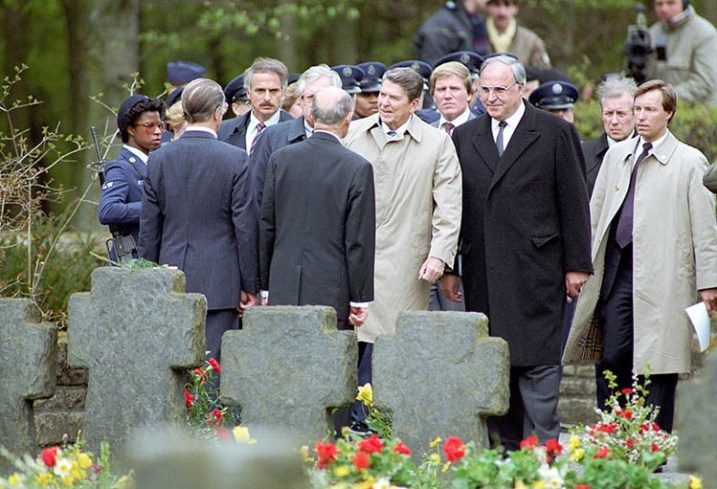
May 5, 1985
President Ronald Reagan, visiting West Germany, conducts a ceremony in front of a memorial at the Bergen-Belsen concentration camp, where he lays a wreath and says, “Here lie people, Jews, whose death was inflicted for no reason other than their very existence.”
He then departs by helicopter to the German World War II military cemetery at Bitburg, where he delivers a speech focusing on reconciliation between the German and American people. His only reference to the Jewish victims of the Holocaust comes when he alludes to John F. Kennedy’s speech at the Berlin Wall in June 1963: “Twenty-two years ago President John F. Kennedy went to the Berlin Wall and proclaimed that he, too, was a Berliner. Well, today freedom-loving people around the world must say: I am a Berliner. I am a Jew in a world still threatened by antisemitism. I am an Afghan, and I am a prisoner of the gulag. I am a refugee in a crowded boat foundering off the coast of Vietnam. I am a Laotian, a Cambodian, a Cuban and a Miskito Indian in Nicaragua. I, too, am a potential victim of totalitarianism.”
The Bitburg stop has caused controversy since it was announced April 11, 1985, that Reagan would lay a wreath at the cemetery. Many, including American Jewish leaders, were outraged when it was revealed that the president had decided not to visit the Dachau concentration camp while in West Germany. Elie Wiesel, the author and Holocaust survivor, said, “I cannot believe the president, whom I have seen crying at a Holocaust remembrance ceremony, would visit a German military cemetery and refuse to visit Dachau or any other concentration camp.” (The New York Times, April 13, 1985)
The White House defends the visit as part of a theme of reconciliation with Europe during the presidential trip. The furor over the trip among American Jews increased in the days after the announcement when it was revealed that the cemetery contains the graves of more than 2,000 members of the SS, the units responsible for carrying out the Nazis’ Final Solution. On April 17, while speaking at the Conference on Religious Liberty, Reagan, in the face of growing opposition, announced that he would include a visit to a concentration camp as part of his trip. The announcement, which indicated that the visit to Bitburg would still take place, did little to quell the anger among American Jewish leaders and American veteran groups.
Wiesel, scheduled to receive a Congressional Gold Medal on April 19, considered refusing the award. Eventually accepting the award, he praised the president for his support of Israel and the cause of Soviet Jewry but admonished the president’s decision to visit Bitburg, saying, “I wouldn’t be the person I am, and you wouldn’t respect me for what I am, if I were not to tell you of the sadness in my heart for what happened during the past week. … This place, Mr. President, is not your place. Your place is with the victims.”
Israeli Prime Minister Shimon Peres, while critical of the planned visit, did not go as far as Wiesel in criticizing the president. He told The New York Times on April 30, “When a friend makes a mistake, it is still a mistake. And a friend is still a friend. Mr. Reagan remains a friend, but I haven’t changed my view: I regret this decision.”
Peres was more critical of West German Chancellor Helmut Kohl, who proposed the Bitburg visit. Former Prime Minister Menachem Begin, who famously opposed Israel accepting reparations from West Germany in the 1950s, said: “President Reagan is a great friend of the Jewish people and the State of Israel, but in this case, he was ill-advised, and all of us are very sorry about it.”
